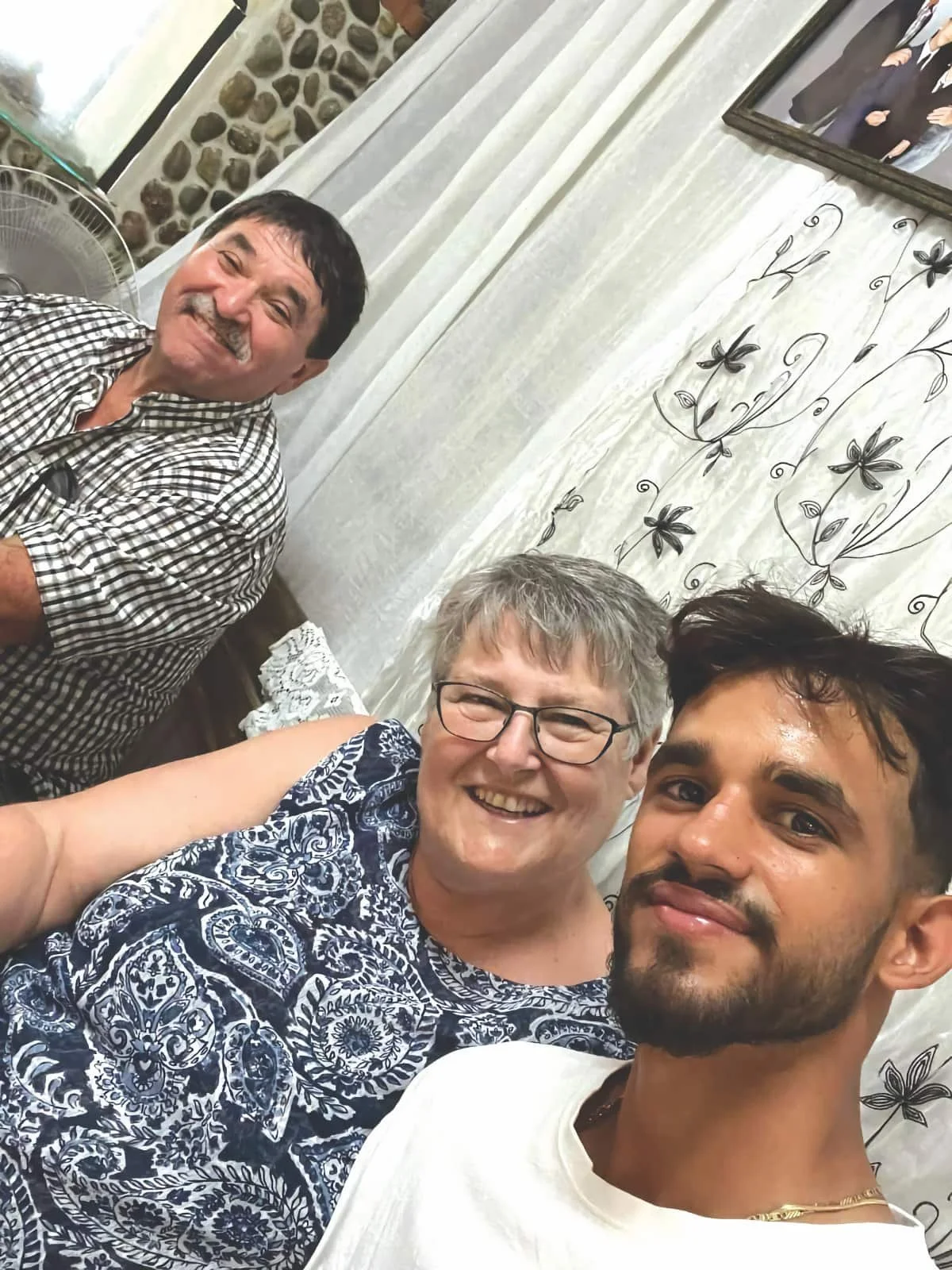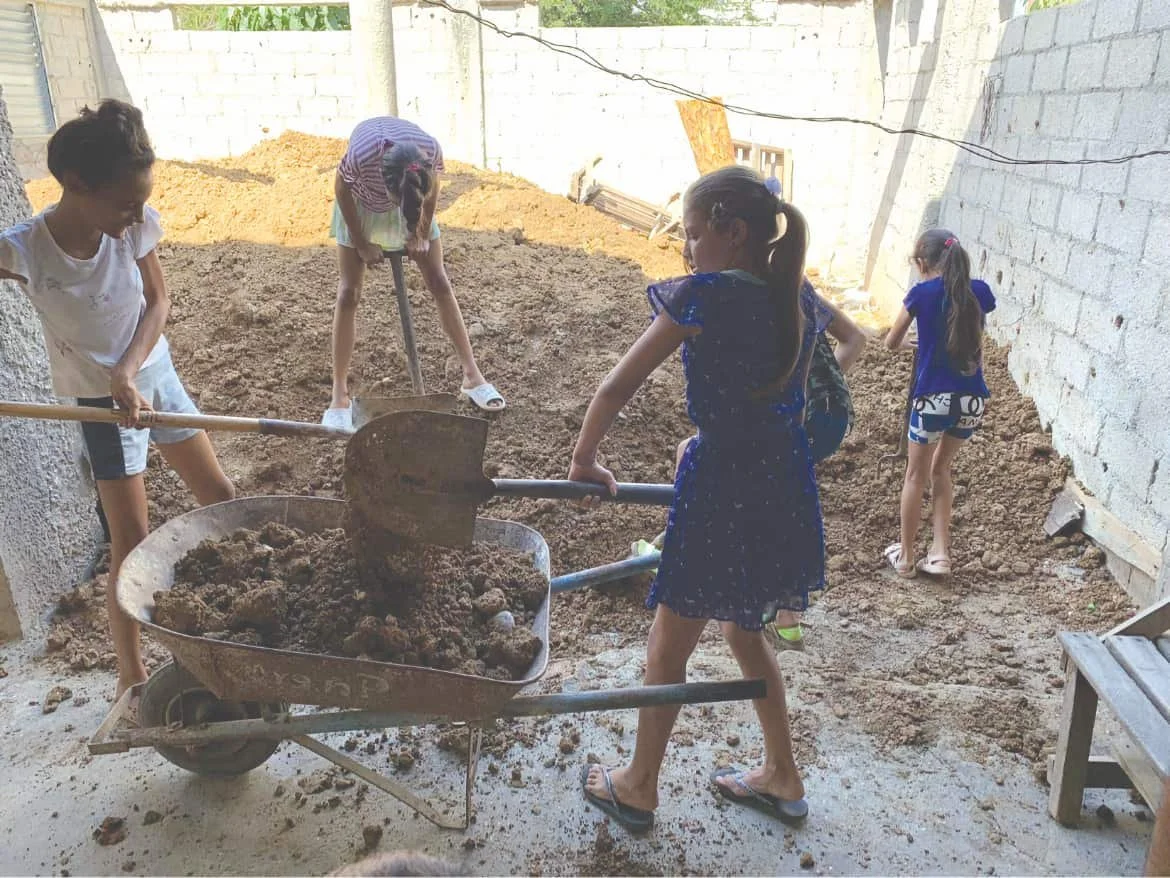More than just a holiday
By Joan Janzen
Like so many Canadians, Ruth and Lloyd Griffith took a vacation to a warmer climate this past winter. They went to visit their Cuban friends, who Ruth says she “considers family”. Although they keep in touch via social media, they hadn’t seen them since 2018.
“We travelled with a group from Ontario called Canada Cuba Project Team, who were doing mission works and checking out locations and churches that needed assistance,” Ruth explained. Lloyd is a board member of the organization, but the trip to Cuba was a holiday and a time to reconnect with their friends. “There’s nothing like actually being there for a real hug,” she said.
Lloyd and Ruth Griffith travelled to Cuba this past winter. They are pictured here with their Cuban friend, 18-year-old Robertico, who graduated from high school in June, 2023. SUBMITTED
Robertico uses his horse and carriage as a taxi for tourists. SUBMITTED PHOTO
It’s all hands on deck whenever construction is underway in Cuba. Even the children are hard at work. SUBMITTED PHOTO
After their visit in 2018, the Griffiths had collected medical supplies for Cuba, which they had been storing in their garage. “We had a hard time trying to ship them,” Ruth said. “Last year, we partnered with an organization out of Manitoba and got the supplies shipped to Cuba.”
During their recent visit to Cuba, the Griffiths visited eastern Cuba, where the population is more underprivileged and less well-equipped. Because earning a living is very difficult, many young people are leaving the country.
“One of our friend’s sons is 18. He had asked is to bring a chain saw so he could use it to do some work,” she said. The young man has been busy using it to help his family. “But gas for the chain saw costs so much that people can’t afford to pay him what it costs for him to do the work.”
Unfortunately, the situation in Cuba was dire back in 2018, but now it has worsened.
There’s been shortages of food for years already, and now they’re having 20 hours at a time without electricity because there’s a shortage of fuel to run their power plants. A lot of people are without water during that time because they can’t run the pumps.
‘Food is ridiculously expensive and the cost of fuel is climbing. They’re not seeing any kind of light at the end of tunnel. It’s so sad,” Ruth observed.
“When we went we took some funds so they can install a cistern because they had been hauling all the water they used in the church. They’re hoping they’ll be able to reach out in the neighbourhood and help people get water they can use,” she said.
However, even if they send money to Cuba for a building project, cement has become scarce and expensive, making it difficult to complete construction. “They are very industrious people, and sometimes they just need a hand up so they can provide for themselves,” she said.
Whenever there’s a building project underway, it’s all hands on deck. Even the children are hard at work.
The Canada Cuba Project Team also helped the church purchase a farm outside the city. The farm raises animals and grows gardens, and it supplies food for the people.
Because of the blackouts, most holiday resorts have backup generators. “We stayed at a hotel in the middle of the city, and there was no coffee available at the restaurants. And Cuba is known for coffee,” Ruth said.
Cuba is rich in resources and farmland, but the are hampered by many restrictions, and can no longer rely on the government for assistance. All of the difficulties have caused people to begin looking for answers, comfort and hope.
“Our friends’ church has grown,” Ruth said. Between their ministry in the country and in the city, they have 400 people attending. But it’s hard for them to have a large enough facility to match their growth.
Ruth and Lloyd’s friend, 18-year-old Robertico used his horse and carriage as a taxi for tourists, providing income for his family. When the Griffiths returned to Canada, they were told Robertico’s horse had been stolen. As a family, the Griffiths gathered funds for another horse.
“These are the kinds of situations that happen over and over again,” she said. After more than 60 years, Cuba’s economy became so distressed that the leaders were forced to give private businesses legal status. Previously, the state owned everything; now, relaxed restrictions allow private businesses to exist.
Meanwhile, the Canada Cuba Project Team is available to lend a helping hand where needed. “It’s very difficult for churches to operate and expand in order to receive people. That’s what we’ve been focusing on—helping pastors do the work in their churches,” Ruth concluded.
And their time spent in Cuba was more than just a holiday. It was a time to reconnect with their Cuban friends and to lend a helping hand.



